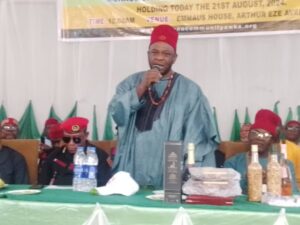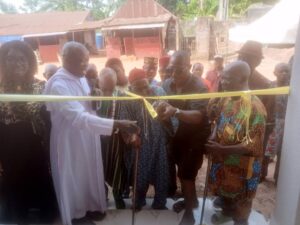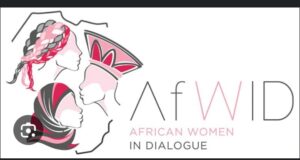A LESSON ON IGBO LANGUAGE ACCORDING TO NON-NATIVE SPEAKERS by Paul Chika Emekwulu

A LESSON ON IGBO LANGUAGE ACCORDING TO NON-NATIVE SPEAKERS by Paul Chika Emekwulu
Sometime in the month of December 2022, I walked into a supermarket where I recently started buying a local snack. As my habit I asked the sales girl what her name was. I wasn’t specific.
“Chinenye,” she responded.
“Spell it,” I requested.
“Chin…” (She started spelling in English). I had to stop her reminding her that she was spelling an Igbo name in English using English alphabets. I did so thinking that she would realize her spelling mistake. In other words, I gave her a long rope to see if she would hang herself and unfortunately, she did.
“You are spelling an Igbo name with English alphabets,” I continued (repeated for emphasis).
Next I gave her a second chance by asking her this time to spell her name in full. Again, she started spelling in English. Happy and chuckling, she said, “We don’t study Igbo Language in school.”
“Which school is that and where is it?” I asked her.
When I asked her this question I never thought her school was in Anambra State, her state of origin. It is a private school. Private schools are breeding grounds for haters of Igbo Language. They are making students lose interest in Igbo Language and they are doing it so well. They are doing this as if losing interest in or disrespecting the Igbo Language is a pre-requisite for being fluent in English Language or any other foreign language.
About a week or so after my encounter with Chinenye at the supermarket I noticed that a video was making rounds on the social media. It was a video of a group of Chinese children who are being taught the Igbo Language. After watching the video I came up with a prediction. My prediction is that the Chinese will not be the only pebble on the beach when it comes to having interest in studying the Igbo Language. The Chinese case is just the beginning. What I couldn’t figure out from the video was whether these children had been taught the Igbo Language alphabets and alphabets as we all know are the building blocks of any language. Words are built from alphabets and from alphabets we build sentences. Apart from other implications of this new development (the Chinese case), here is what I think (just my personal opinion). (a) We the native speakers of the Igbo Language are not fair to the language. (b) We are very dishonest to our language and we know it. (c) We treat our language exactly the same way some of us treat the traffic lights in some cities in Igbo land. The law says when it is red we stop and when it is green, of course we proceed. Unfortunately, what do we do? Most of us proceed at both times. That is dishonesty towards the lights and some of us are still busy wondering what dishonesty towards the traffic lights could be.
In one of my books about the Igbo Language I said that non- native speakers like the Chinese will soon be the ones to take over the teaching of Igbo Language in our schools. Not surprising. Some of us are wondering why a foreigner (non-native speaker) will be the best resource for teaching Igbo Language to our children or grandchildren in time to come.
Here is why.
When you as a native speaker write Okonkwọ as Okonkwo, pronounce it rightly as Okonkwọ, that is dishonesty and disrespect towards the Igbo Language.
When you as a native speaker wrongly write Ekwulọbịa Urban Mass as Ekwulobia Urban Mass, the Chinese non-native speaker will rewrite it rightly as Ekwulọbịa Urban Mass and pronounce it rightly as such.
When you as a native speaker wrongly write ụtụtụ ọma as ututu oma and pronounce it rightly as in Igbo Language, you are being dishonest. The Chinese non-native speaker will write it rightly as ụtụtụ ọma and pronounce it rightly as ụtụtụ ọma.
When you as a native speaker wrongly write Eziokwu bụ ndụ as Eziokwu bu ndu and pronounce it rightly as Eziokwu bụ ndụ, the Chinese non-native speaker will rewrite it as Eziokwu bụ ndụ and pronounce it rightly as Eziokwu bụ ndụ.
When you as a native speaker wrongly write Emuche as Emuchay or Chidị as Chyddy and pronounce them rightly as in Igbo Language, the Chinese non-native speaker will rewrite Emuchay and Chyddy rightly as Emuche and Chidị and pronounce them rightly as such. respectively.
When you as a native speaker wrongly write Ndị Anambra as Ndi Anambra and pronounce it rightly as Ndị Anambra, the Chinese non-native speaker will rewrite Ndi Anambra as Ndị Anambra and pronounce it rightly as such. Of course there are other countless cases.
Please take note of this: You cannot spell names, places and things in one language and pronounce in a different language, no matter how similar the alphabets are. So, I said that to say no matter how similar English and Igbo alphabets are, you cannot spell in English and pronounce in Igbo. Chinese non-native Igbo Language speakers know this very well but we the Igbo Language native speakers pretend not to know. When shall we start doing the right thing?
Now when you write Okonkwo and pronounce it rightly as Okonkwọ, when you wrongly write
Ekwulọbịa Urban Mass as Ekwulọbịa Urban Mass and pronounce it rightly as Ekwulọbịa Urban Mass, when you wrongly write ụtụtụ ọma as ututu oma and pronounce it rightly as ụtụtụ ọma, when you wrongly write Eziokwu bụ ndụ as Eziokwu bu ndu and pronounce it rightly as Eziokwu bụ ndụ, when you wrongly write Emuche as Emuchay or Chidị as Chyddy and pronounce them rightly as Emuche and Chidị respectively, when you wrongly write Ndị Anambra as Ndi Anambra and pronounce it rightly as Ndị Anambra, what you are saying leaves much to be desired. What you are saying is that you can use o and ọ interchangeably, you can use i and ị interchangeably, and
you can use u and ụ interchangeably.
Now listen to me and listen very well. When you write as pointed out above, that is wrong, that is an insult, and that is an affront not only to the Igbo Language as a language but all Igbo speaking people all over the world. That has to be discouraged.
Every language has some kind of music embedded in it. Because of our dishonest towards the Igbo Language only non-native speakers can bring out this music beautifully when it comes to the Igbo Language. The reason of course is clearly known. In any language it is only when you start spelling words the way they should be spelt, writing words the way they should be written and pronouncing words the way they should be pronounced that your speech starts getting closer to that of the native speaker and that’s when you start being understood by the majority. Putting honesty into consideration, the words udo (peace) and ụdọ (rope) will not have the same sound when both are found in a piece of music. Each will sound distinctly because the vowels and consequently, the words are different.
If disrespect and dishonesty towards the Igbo Language were to be a crime (and they are, only metaphorically) punishable under the law, academic and financial institutions, authors, printers, churches, advertisers, newspaper and magazine editors, graphic artists and designers, businesses, and of course individuals will be serving different sentences depending on the severity of disrespect and dishonesty meted to the language. Some will be sent home as soon as they arrive while others will be remanded longer In custody.
There is one basic fact non-native speakers know about their respective languages – a fact we Igbo Language native speakers pretend not to know but know very well. We pretend not to know because of intention which is usually evil, yes though again metaphorically (not to be confessed before a Catholic priest for those who are Catholics). Every foreigner knows that losing interest in his or her native language or mother tongue is not a condition for mastering a foreign language in this case, the Igbo Language.
Some Igbo parents always pride themselves by saying that their children don’t speak Igbo Language but they can understand it.
Listen to this:
Understanding a language when spoken and not able to speak the language is not in any way whatsoever an added advantage. A Chinese parent for example knows better. A Chinese parent knows better because he or she knows that understanding a non native language such as the Igbo Language and not able to speak Igbo Language is not synonymous with understanding Chinese and not able to speak Chinese.
Unfortunately for Igbo Language, if languages were products displayed for sale, the Igbo Language native speakers will pay for the Igbo Language as much as the vulture is ready to pay for a carcass. That is really sad but true.
In conclusion, always remember this: No Igbo man or woman anywhere in the world has ever been and will ever be asked to present a certificate of rejection of the Igbo Language before being admitted into an English Language class or as a pre-requisite (requirement) for mastering the English Language or any other foreign language.









